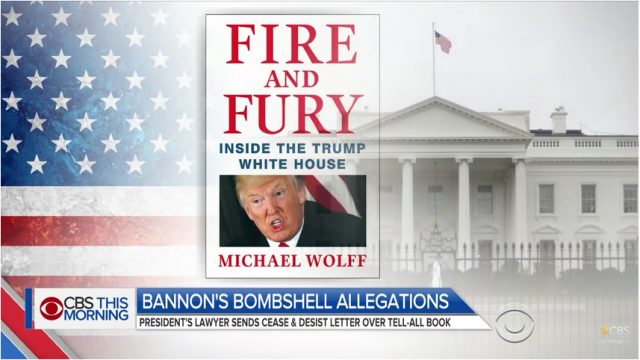
President Donald Trump‘s legal team sent a cease-and-desist letter to Henry Holt and Co., the publisher of Michael Wolff‘s forthcoming Fire and Fury: Inside the Trump White House in order to block the book’s publication before it’s official release next week. According to Fox News, the letter was also sent to the publishing house’s president Steve Rubin and Wolff himself.
Let’s be clear: Blocking the release of Wolff’s book is something Trump simply cannot do.
Attempting to preemptively halt the publication of an unreleased book is not only a comically offensive and empty attack on basic notions of journalistic freedom, it’s also plainly unconstitutional. This is an exceedingly easy call.
Constitutional precedent here is very clear and can easily be explored in Supreme Court jurisprudence on the concept of prior restraint. In the 1976 case Nebraska Press Assn. v. Stuart, Justice Warren Burger, writing for the unanimous court, observed, “[P]rior restraints on speech and publication are the most serious and the least tolerable infringement on First Amendment rights.”
Stuart concerned the publication of information related to a criminal trial, however, the Supreme Court noted that the doctrine of prior restraint was particularly salient regarding issues concerning “communication of news and commentary on current events.” The only time prior restraint could be acceptable in such an instance–a criminal trial-like situation–is when reporting would constitute a “clear and present danger” to the possibility of a fair trial.
Obviously, Trump’s attempt to bar publication of Fire and Fury doesn’t jibe directly with the above facts, however, the legal reasoning in the Stuart case is relevant nonetheless and Justice Burger’s summary statement on prior restraint provides the most apt recitation of the Constitutional standard at issue here.
A more similar set of facts wouldn’t do Trump any better.
In the 1931 case Near v. Minnesota, the Supreme Court had the occasion to rule on a local ordinance which prohibited the publication of a “malicious, scandalous and defamatory newspaper.” The five-member majority, led by Chief Justice Charles Hughes, found the Minnesota law in blatant violation of the First Amendment–as applied to the states by the 14th Amendment. The only loopholes allowed for prior restraint of the press by the government resulting from Near are when the media intends to reveal critical military information, publish obscenity, or directly incite violence.
Here, Wolff’s book would probably quite easily be described as containing some malicious material. Certainly some of the book’s contents are salacious. And there’s already litigation regarding defamation. So, Near is perhaps the most on-point case here. And it completely eviscerates Trump’s position.
It doesn’t really need to be said, but in the interests of being thorough: nothing so-far-released in Wolff’s book contains information related to military strategy or troop movements. It does not appear to contain any sort of obscenity in the legal sense. And, at least so far, it doesn’t seem to be directly calling for violence.
There’s simply no plausible way Trump can win here. In fact, by sending the cease-and-desist letter–penned by Harvey Weinstein‘s former attorney Charles Harder–Trump is just making sure more people ultimately hear about and read Wolff’s book.
Trump may attempt to claim he’s not trying to silence Wolff as the government per se, but simply as a private citizen with a litigious streak and hurt feelings. But that argument doesn’t hold up to a scintilla of scrutiny. As the President of the United States, Trump doesn’t get to take his government hat off whenever it suits him. All of his actions–especially legal or quasi-legal actions–have the imprimatur of state power associated with him.
And, in any event, Trump’s heavy-handed attempt to squash Fire and Fury before thousands of Amazon orders ship is little more than the lawyer-written whinging of a wounded, stupid man.
[image via screengrab/CBS]